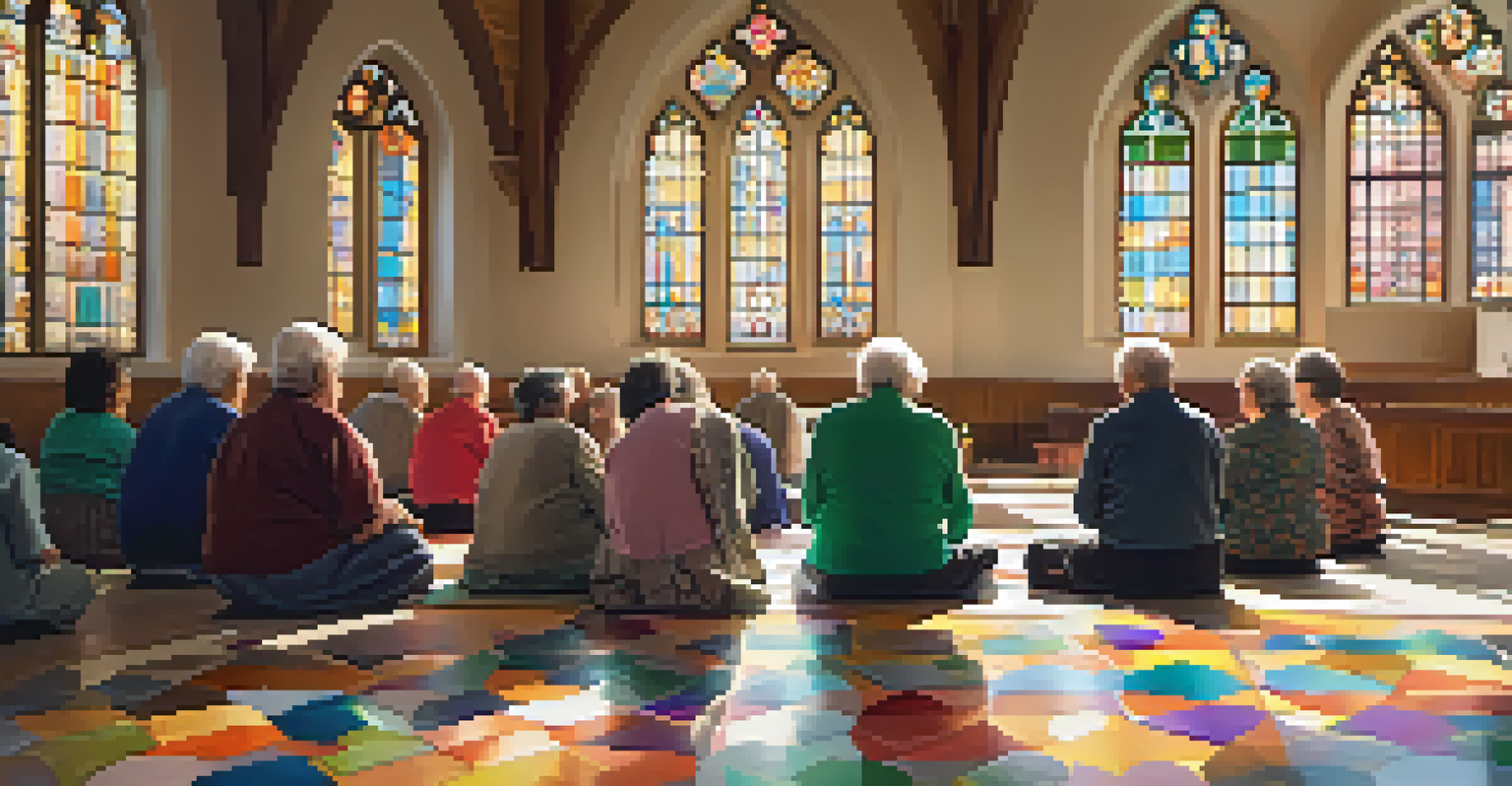The Connection Between Faith and Longevity in Seniors

Understanding Longevity: More Than Just Genetics
Longevity is often attributed to genetics, but lifestyle choices play a significant role. For seniors, having a healthy diet, regular exercise, and social interactions can be just as crucial. However, another key factor that's often overlooked is faith, which can influence mental and emotional well-being.
Faith is taking the first step even when you don't see the whole staircase.
Faith can provide a sense of purpose and belonging, which contributes to a healthier mindset. When seniors feel connected to a community or believe in something greater than themselves, it can lead to lower stress levels. This, in turn, can have a positive impact on their overall health and longevity.
Moreover, studies have shown that individuals who engage in spiritual practices tend to have lower rates of depression and anxiety. This emotional stability is essential for maintaining physical health, as it encourages a more active lifestyle and better coping mechanisms.
The Role of Community in Promoting Well-Being
Faith often brings people together, creating a supportive community. For seniors, being part of a community can combat feelings of loneliness and isolation, which are common in later years. This social support network can be vital for emotional health and longevity.

Shared beliefs and practices can foster deep connections among members, providing not just companionship but also a sense of accountability. For instance, seniors who participate in group activities at their faith centers are more likely to stay active and engaged. This leads to healthier habits and a greater quality of life.
Faith Enhances Emotional Well-Being
Engaging in faith can provide seniors with a sense of purpose and community, significantly boosting their mental health and emotional stability.
Additionally, these communities often encourage volunteering and helping others, which can boost one's sense of purpose. Studies suggest that seniors who feel they contribute to their community often report higher levels of happiness and life satisfaction, further supporting their longevity.
Faith as a Coping Mechanism During Tough Times
Life can be unpredictable, especially for seniors facing health issues or the loss of loved ones. Faith can serve as a powerful coping mechanism during these challenging times. It offers comfort and hope, allowing individuals to navigate through grief and uncertainty.
The greatest discovery of my generation is that a human being can alter his life by altering his attitude.
For many, prayer or meditation can provide moments of peace amidst chaos. These practices help reduce stress and can lead to better physical health outcomes. When seniors feel supported by their faith, they may also experience improved resilience in the face of adversity.
Moreover, having a spiritual framework can guide seniors in making sense of their experiences. This perspective can lead to a more positive outlook on life, which is essential for both mental and physical health and can significantly impact longevity.
The Psychological Benefits of Faith for Seniors
Faith can profoundly affect mental health, particularly in seniors. A strong belief system can reduce feelings of anxiety and depression, promoting a more optimistic outlook on life. This psychological uplift is crucial for maintaining both mental clarity and overall well-being as one ages.
Research indicates that seniors who actively practice their faith often report higher life satisfaction. Engaging in rituals, attending services, or even studying spiritual texts can provide structure and meaning to daily life. This routine can be comforting, especially in a world that often feels chaotic.
Community Reduces Isolation
Being part of a faith-based community helps seniors combat loneliness and fosters social connections, which are vital for their overall well-being.
Furthermore, faith can instill a sense of gratitude, allowing seniors to appreciate the small joys in life. This positive mindset can lead to healthier lifestyle choices, such as eating well and staying active, which are all linked to increased longevity.
Faith and Healthy Lifestyle Choices
Faith communities often promote healthy living, encouraging members to take care of their bodies and minds. Many religious organizations offer programs that focus on physical fitness, nutrition, and mental health. This holistic approach can lead to better health outcomes for seniors.
For example, many churches and faith groups organize exercise classes, healthy cooking workshops, and wellness seminars. Such initiatives not only foster community but also empower seniors to make positive lifestyle changes. These changes can significantly impact their longevity and quality of life.
Moreover, the emphasis on moderation and balance in many faith teachings can translate into healthier habits. Seniors who follow these principles often find it easier to maintain a balanced diet and engage in regular physical activity, both of which are crucial for longevity.
Spiritual Practices that Enhance Longevity
Various spiritual practices can contribute to a longer, healthier life for seniors. Activities such as meditation, prayer, and mindfulness promote relaxation and stress reduction, which are essential for overall health. These practices can also improve focus and emotional regulation.
Engaging in regular meditation has been shown to reduce blood pressure and enhance immune function, factors that directly affect longevity. Furthermore, mindfulness encourages individuals to live in the moment, which can lead to greater appreciation for life’s experiences and relationships.
Spiritual Practices Promote Longevity
Incorporating spiritual practices like meditation and prayer can lead to healthier lifestyle choices, contributing to increased longevity for seniors.
Many seniors find that incorporating these spiritual practices into their daily routines not only enhances their mental health but also fosters a sense of connection to something larger. This connection can provide a comforting foundation that encourages healthier lifestyle choices.
The Interplay Between Faith, Happiness, and Longevity
It’s no secret that happiness plays a significant role in longevity. Faith can be a substantial contributor to happiness, providing purpose, community, and support. Research shows that happy individuals often live longer, making the connection between faith and longevity even more compelling.
Seniors who report higher levels of happiness often engage more in their communities and maintain active social lives. This social engagement is beneficial not just for emotional health but also for physical health, as it encourages mobility and interaction with others.

Furthermore, the sense of gratitude often fostered through faith practices can enhance life satisfaction. When seniors focus on what they have rather than what they lack, they tend to experience greater joy, leading to healthier lifestyles and, ultimately, increased longevity.
Conclusion: Embracing Faith for a Fuller Life
The connection between faith and longevity in seniors is multifaceted and profound. From fostering community bonds to providing emotional support during tough times, faith can significantly enhance quality of life. Embracing faith can be a powerful tool for seniors looking to enrich their lives and promote longevity.
As we’ve explored, the benefits of faith extend beyond the spiritual; they impact mental and physical health as well. Encouraging seniors to engage in their faith communities can lead to healthier lifestyles and a more fulfilling life overall.
In conclusion, integrating faith into daily life offers a roadmap for seniors seeking to live longer and happier lives. By nurturing their spiritual side, seniors can cultivate a sense of purpose and belonging that ultimately contributes to their longevity.